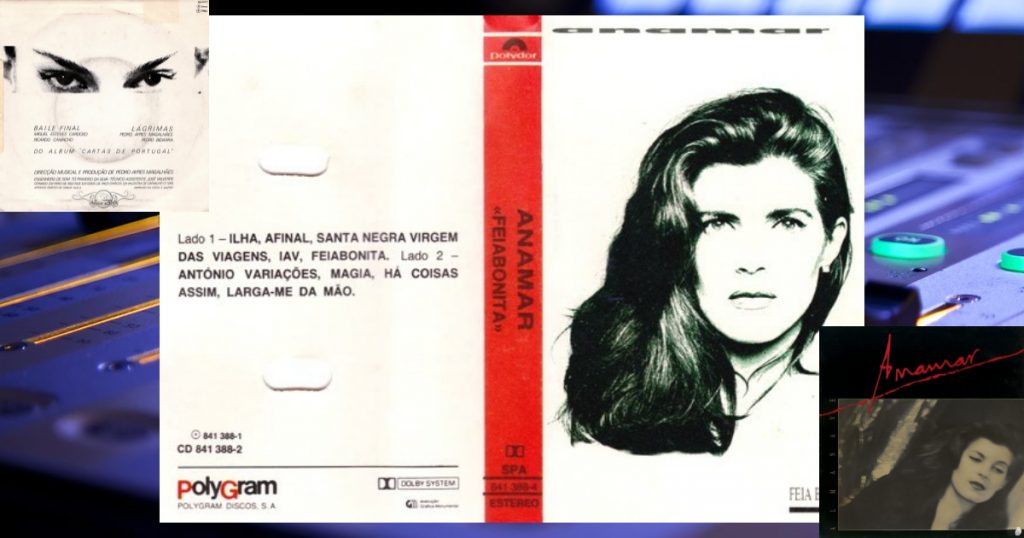Ana Maria Alfacinha de Brito Monteiro was born in Lisbon and made her stage debut at the age of 17. While studying at the National Conservatory’s Theatre School, she set off on a journey with a friend to London, passing through Paris. However, she ended up in Sweden, where she stayed for nine months. In Gothenburg, she formed a punk band called Odd Combo, performing in English. It was during this time that she adopted the stage name Anamar.
Eventually, she did make it to London, but soon returned to Lisbon, back to Avenida de Roma and the Conservatory. She worked as a script supervisor for RTP (Portuguese public television) and even opened her own shop. In 1982, she began working as a doorkeeper at the iconic nightclub Frágil, where she stayed until 1985.
In 1983, she recorded the album Cartas de Portugal for the label Fundação Atlântica, with musical direction by Pedro Ayres Magalhães and lyrics by writers such as Miguel Esteves Cardoso and Paulo Bidarra. The album was never officially released—only a single came out, featuring the tracks “Baile Final” and “Lágrimas”.
Together with her vocal coach at the time, Luís Madureira, she recorded the song “O Teu Amor Sou Eu,” a version of an Irving Berlin piece with Portuguese lyrics by Miguel Esteves Cardoso. In 1984, she collaborated with António Emiliano on the stage show Alana, performed at Frágil. She also took part in Coproduction, produced by Manuel Reis, with music by António Emiliano.
She appeared in The Park, a play by Botho Strauss, staged by Teatro da Cornucópia, where she shared the stage with Eunice Muñoz. Her performance earned her the 1985 Best New Actress Award.
In 1986, she featured on the Divergências compilation by Ama Romanta, which went on to release her maxi single Amar por Amar in March 1987. In José Nascimento’s film Repórter X, she appeared as an actress and performed the song “Dor d’Alma,” written by Sérgio Godinho. Around this time, she also acted in the films Crónica dos Bons Malandros and Um Adeus Português.
Her album Almanave was released in 1987 by Polygram and featured a new version of “Canção do Mar”. To promote the silver-certified album, she scheduled a solo concert at the Lisbon Coliseum: “The night of November 13 was a triumph for some, but a disaster for many others.”
She again collaborated with António Emiliano on the soundtrack for the ballet 13 Gestures for a Body, choreographed by Olga Roriz for the Gulbenkian Foundation.
In 1989, she returned with the album Feia Bonita, produced by José Peixoto and featuring contributions from Nuno Rebelo and guitarist Mário Delgado.
The album Feia Bonita features tracks such as “Feia Bonita”, “Ilha”, and “Afinal”. Around this time, Anamar became a mother, and her artistic career took a backseat. From then on, her public appearances became increasingly rare, with notable exceptions including the film Vida Normal (1994) by Joaquim Leitão, and the stage production O Ensaio.
In 1997, BMG released the album M, produced by André Louro de Almeida (formerly of Croix Sainte). The project was launched with a live concert held at the Estufa Fria in Lisbon.
At the end of 2000, at the invitation of Tiago Torres da Silva, Anamar joined Pilar and Né Ladeiras for two collaborative concerts titled SMS8. The live recordings from these performances were released in 2002 by Zona Música under the title Ao Vivo – com Pilar, Né Ladeiras e Anamar.
In 2003, she performed in the show-concert Wild Cabaret, staged at Teatro São Luiz, where she portrayed Rita Hayworth.
In May 2003, Universal (formerly Polygram) released Afinal, an anthology featuring 17 tracks from her recording career.
Her album Transfado was released in October 2004 by CNM. Subtitled Fado, Tango and the Portuguese Soul, it featured Daniel Schvetz on piano, Luís Petisca on Portuguese guitar, and Ricardo Cruz on double bass and percussion.





